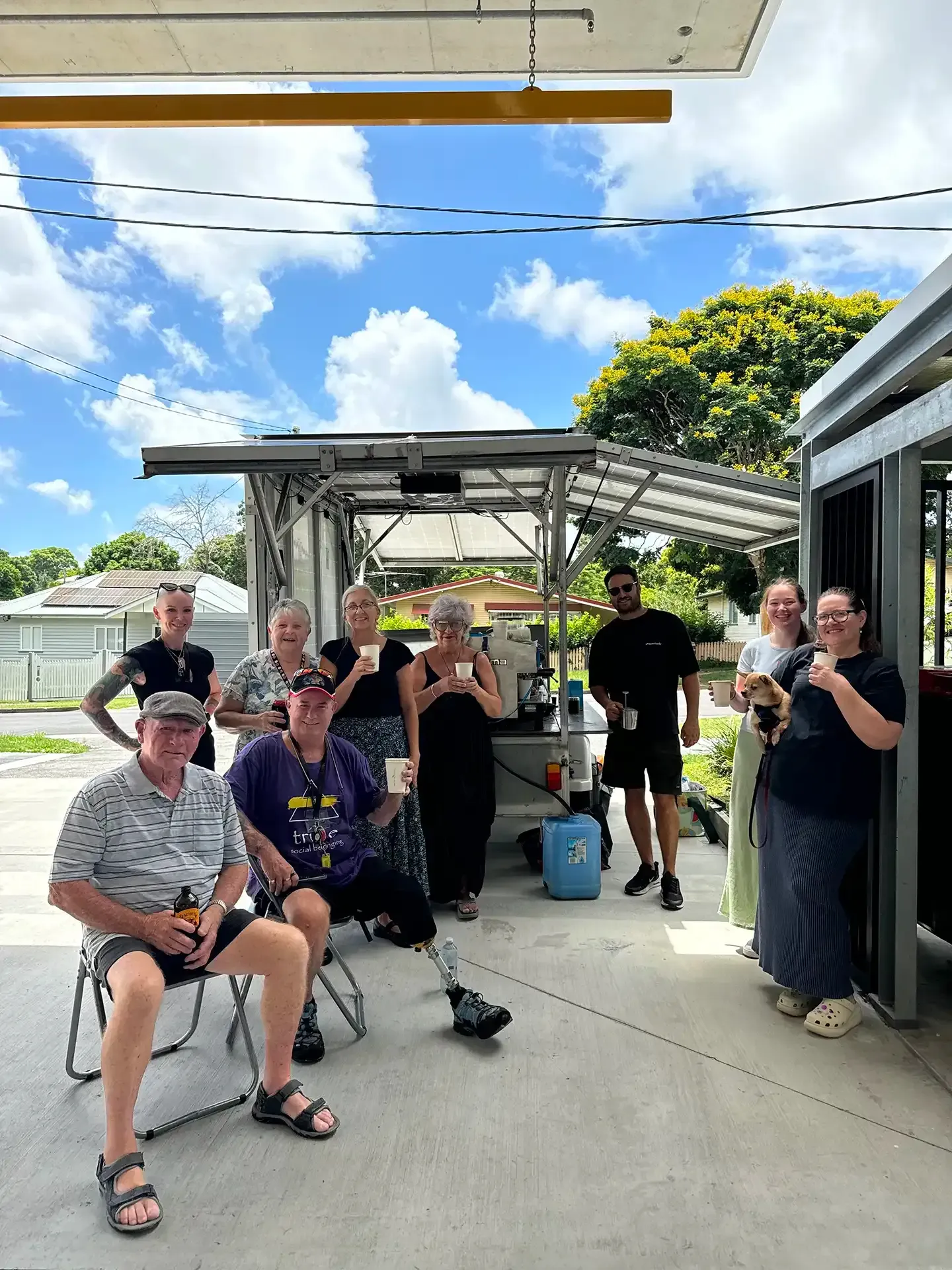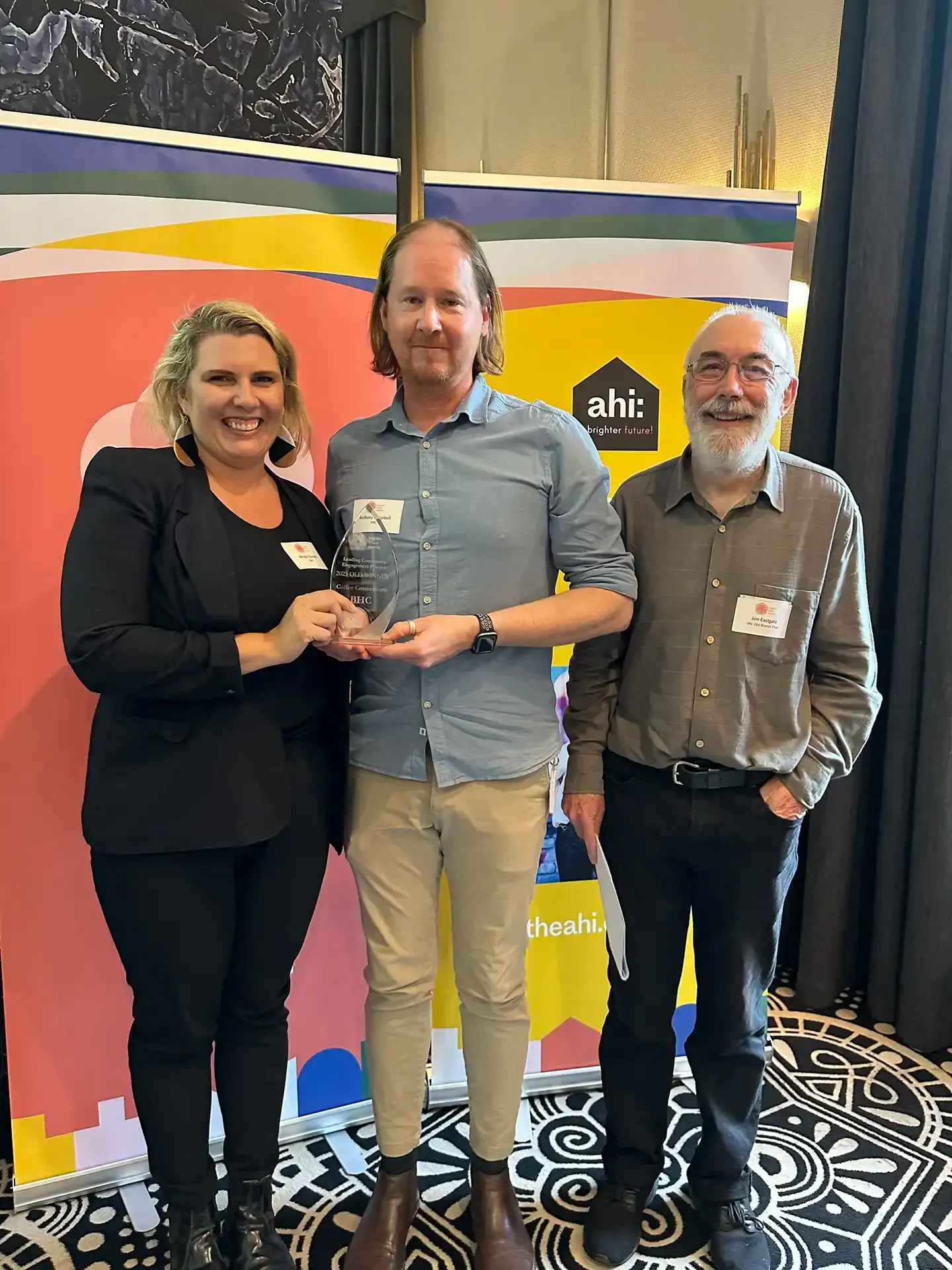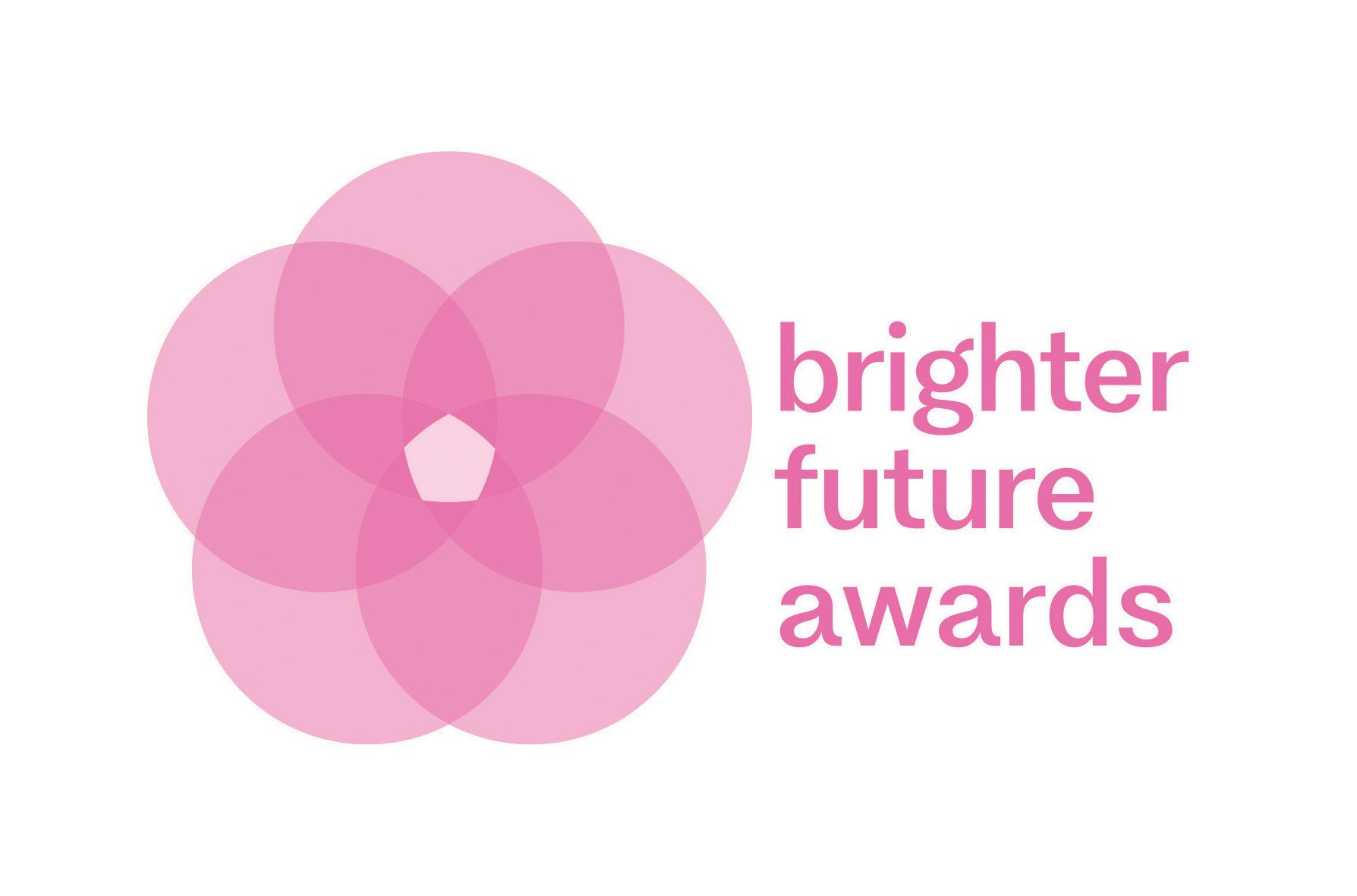BHC, COFFEE CONNECTIONS: ahi: Leading Community Engagement QLD
Anthony Campbell, BHC and the Coffee Connections program are living proof that you don’t need to re-invent the wheel to help tenants better engage with their peers and the wider community.
The Brisbane Housing Company (BHC) and State Government’s Youth and Family Services’ (YFS) Substation 33 took out the top honours in the 2023 QLD ahi: Brighter Future Awards in the category of Leading Community Engagement. Known as Coffee Connections, the initiative brings BHC tenants together in an informal, accessible and approachable way as part of a place-based, inclusive empowerment model.
In describing the program to the ahi: judges, BHC talks about using food and free coffee to drive positive interactions between residents, their neighbours and the organisation.
"85% of residents believed the initiative had significantly enhanced their sense of belonging."
The coffee cart has successfully connected a multitude of people, hosting social gatherings at various locations, like the BHC boarding rooms in Fortitude Valley, South Brisbane; large community housing properties and BHC seniors’ properties. Their nomination highlighted the fact that 65% of residents surveyed described Coffee Connections as giving them an opportunity to acquire new skills, while 85% of residents believed the initiative had significantly enhanced their sense of belonging.
Furthermore, BHC highlights how Coffee Connections has helped them identify gaps in their delivery of health and wellbeing services, and accordingly, engage local and community support and wrap-around services to become involved in coffee cart events.
Anthony Campbell, the program convenor for BHC tells HousingWORKS the involvement of local health services was extremely well-received by participants: “BHC really encourages self-based support so, when we've been running Coffee Connections, we’ve invited some health and community services to participate. They basically come over and just socially have a coffee with residents."
“We know that some of our boarding room residents have a history of drug and alcohol use so we've invited drug and alcohol support services to come onsite and provide residents with information about harm minimisation and places to receive intensive support. It's been a good platform for us to distribute important information to residents in that relaxed environment.”
“As a part of Coffee Connections, we've also run health clinics. There was one instance where we partnered with a health service where a registered nurse from Micah Projects came along and was able to talk about Hepatitis C and conduct Hep C tests for residents. The tests were completely voluntary; it was something the residents wanted to show initiative and support the message we were trying to provide to the complex, which was a good outcome.”

“It allows residents to come down freely for a coffee. There are no conditions or barriers."
Anthony says the confidence-building and the social positivity aspect that Coffee Connections imparts deserves highlighting: “It allows residents to come down freely for a coffee. There are no conditions or barriers. Pretty much everyone's welcome to come down and have something to drink, and have conversations with the residents and their neighbours, and the BHC staff too.”
Anthony relates the story of a resident who, for lack of a better word, decided to force himself to leave his apartment and enjoy a coffee on his home turf.
“This was someone who decided to come down and engage with the coffee trailer, and Bradley [who operates the coffee machine] and the BHC staff. It was during those conversations that he disclosed how he suffers from social anxiety, and it was quite hard for him to join in. But he wanted to have a coffee and get some positivity in his life. We were able to discuss referring him to some mental health and wellbeing services, and we were able to link him into those. That turned out to be a positive thing for him.”
“It's like that for a lot of residents with social anxiety,” Anthony adds. “Because the program is actually place-based, the residents feel more comfortable about coming down in a safe environment within their building, and engaging with Brad, who runs the cart, and other BHC staff, and just having conversations that can actually lead to linking residents with health and support services.”
Along with the 'human' outcomes, Coffee Connections has an interesting and important environmental sustainability aspect to it, with Substation 33’s coffee cart using solar power from recycled Electric Vehicle (EV) batteries.
"I was always fascinated by the fact that [the coffee cart] was completely off the grid; that it was solar-powered using recycled EV batteries."
“Before joining BHC, I was working for another organisation doing youth work,” Anthony begins. “At our headquarters, I remember going to work and there used to be a solar-powered coffee trailer. I was always fascinated by the fact that it was completely off the grid; that it was solar-powered using recycled EV batteries. You'd be able to actually see how the batteries were working the coffee machine and the coffee grinder, as well as the other items on the trailer.”
“I'd never seen that before,” he continues. “Every time I would go there, everyone—staff members and clients that we were working with—were just engaging in a positive way; having a cup of coffee or a hot chocolate or a cup of tea or something like that. So, when I came to BHC and we were talking about ways we could engage with our residents, I looked back at how that was such a great experience for staff and clients, and just started to explore––could we actually copy this for our residents in our buildings?”
Accordingly, Anthony tracked down the solar-powered coffee trailer to the YFS Social Enterprise initiative, Substation 33 and, in about the time it takes to extract a shot of espresso, Coffee Connections was on its way to becoming a reality. Anthony readily agrees the originality of the trailer is an integral part of the program’s success.
“Because it's solar powered," he states, "it's not your typical coffee trailer or coffee cart. There's that uniqueness there––it's good for the environment and it's a conversation piece for people.”

"I love that aspect––the curiosity factor merging with great conversation.”
“While the residents are there, Brad––who actually built the cart––is very passionate about the coffee trailer and has heaps of conversations about the solar panels and how the batteries work. So, not only are you having good conversations with a cup of coffee or a tea or a hot chocolate, but you're also having conversations about solar power and observing how the trailer works and all that. I love that aspect––the curiosity factor merging with great conversation.”
Conversations and health information are just the tip of the Coffee Cart iceberg. BHC organised a place-based employment and participation expo at one of their properties too, which houses over 100 residents. Across the day, many of the residents took part, talking with guests from TAFE, Job Active, Employment Services and Volunteering QLD. Free barista-made coffee not only encouraged residents to come out of their rooms and find out more about these services but provided a relaxed setting for many residents to learn how to make a latte or flat white for the first time.
Anthony readily admits that Brad’s passion for what he does has been instrumental in the success of Coffee Connection’s employment engagement: “It’s all credit to Brad. He created the solar-powered coffee trailer, and he's also a qualified barista.”
“We thought of not only providing the coffees for residents that Brad made for them but also allowing residents to make the coffees themselves, and then, while they're there, making a line of coffees for the other residents that came up and wanted something to drink,” he continues. "We all thought that was good in confidence-building and some skills development, especially for people who may want to work in hospitality. Being able to do a bit of a test with Brad and the coffee machine on the trailer just, sort of, planted that seed if someone was thinking about exploring this as a career."
Anthony sees it as a great privilege and honour to be nominated for the ahi: Leading Community Engagement Award and was genuinely surprised when they won: “I attended the event with a lot of my colleagues from Brisbane Housing Company, and some of them were also nominated in other categories. A lot of the Queensland community housing providers were in attendance, which was great.”
He notes, as well as the people he’s already talked about, there were some vital contributors to the success of Coffee Connections, particularly Elevate Residential and his BHC colleagues.
“Everyone throughout the journey of Coffee Connections has played a part in supporting the program. Rebecca Oelkers, our CEO, is amazing. She's a big supporter of providing opportunities for our residents to thrive in their buildings. And that can include someone coming out and having a coffee to build their self-esteem and confidence, and to increase the positive communities within the buildings.”
“Also, the team that I'm in––the Resident and Communities Team within BHC," Anthony acknowledges. "They've provided great support with organising the visits to the buildings, supporting Brad on the ground when he's making the coffees and engaging in conversation with residents."
“The housing managers within BHC have been a terrific support when we've been organising the visits. And we've got a specific strategic project and communications team, and they've been great because they actually help promote the program to our residents––either by creating posters and flyers or putting it on our social media pages."
“We're all in it for the same reason," he concludes.
Other articles you may like

We acknowledge the Wathaurong, Yuin, Gulidjan, and Whadjuk people as the traditional owners of the land where our team work flexibly from their homes and office spaces. Ahi Australia recognises Aboriginal and Torres Strait Islander peoples as the first inhabitants of Australia and the traditional custodians of the lands where we live, learn and work. Ahi New Zealand acknowledges Māori as tangata whenua and Treaty of Waitangi partners in Aotearoa New Zealand.
Copyright © 2023 Australasian Housing Institute
site by mulcahymarketing.com.au



